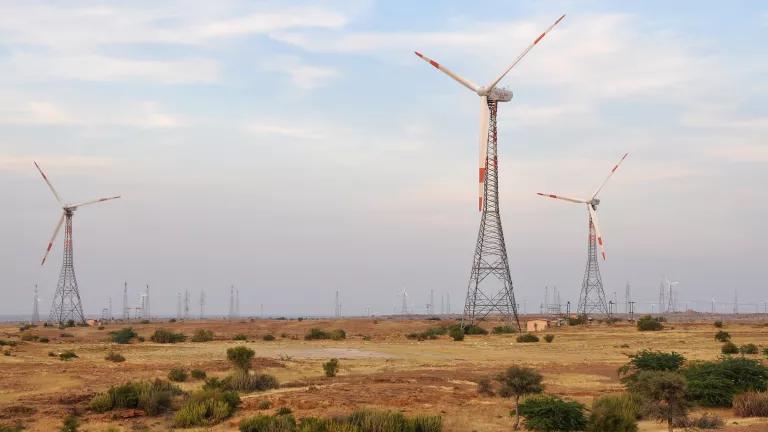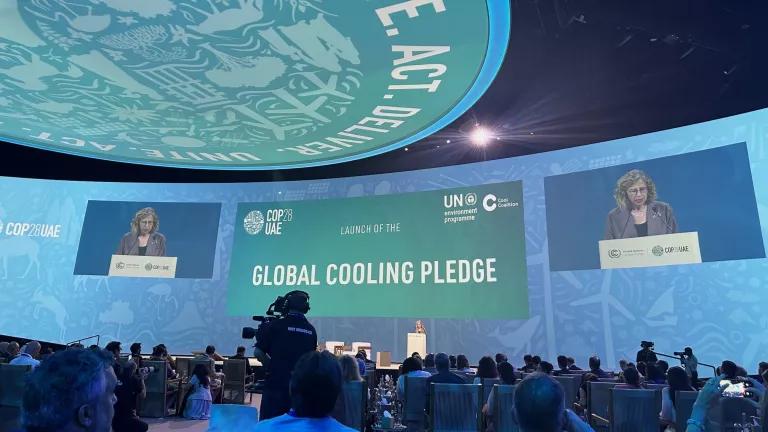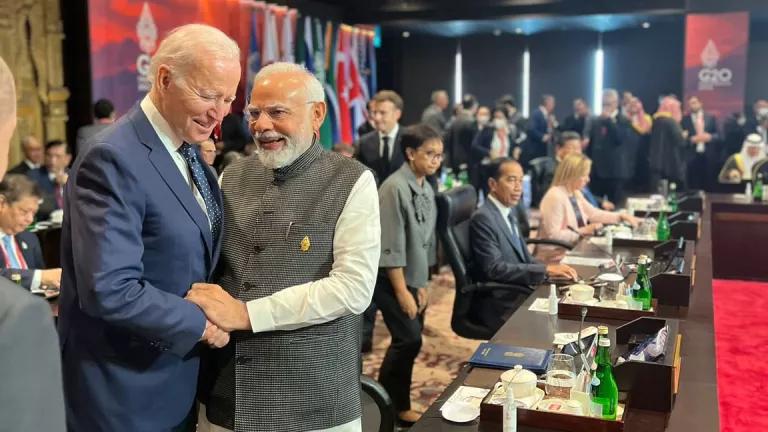India Leads on Climate Action as Trump Exits Paris Agreement
India—the world’s third-largest emitter of climate-warming greenhouse gases—is showing bold leadership by aggressively moving ahead with climate action and clean energy development that will protect people from climate harm and boost its economy.

Wind turbines in Jaisalmer, Rajasthan
The Trump administration has announced its intent to withdraw the United States from the Paris Agreement, but leading U.S. cities and states are vowing to continue strong climate action, proving that President Trump’s decision is not supported by all Americans. In fact, the vast majority of U.S. citizens and businesses—70 percent—wanted their country to stay in the agreement.
The United States will now join only two other countries—Syria and Nicaragua—as non-participants in the December 2015 global agreement signed by 195 countries. As my colleague Jake Schmidt puts it, “Trump’s decision is an assault on our children’s future, American companies, and all the countries in the world.”
NRDC President, Rhea Suh, issued a strong statement after the announcement:
“This is a grave and grievous mistake that hurts our country—starting now. Trump’s extremism has isolated us from the global coalition we helped to create—with China, Germany, India, Japan and 190 other countries—to fight the central environmental challenge of our time. He’s sidelined American workers in the clean energy boom that's remaking the global economy. And he’s abandoned our children to climate catastrophe. It’s on the rest of us now—state and local officials, business leaders, citizens, educators, consumers, activists and congressional members who grasp the stakes for our future—to keep the promise of Paris alive.”
Shortly after Trump’s announcement, the governors of the states of California, New York, and Washington—representing over one-fifth of U.S. Gross Domestic Product—announced formation of the United States Climate Alliance, a coalition that will convene U.S. states committed to upholding the Paris Climate Agreement and taking aggressive action on climate change.
Countries around the world have signaled that stepping away from the Paris Agreement would be a bad move. Thirty countries earlier this month called on all countries to implement their commitments under the agreement. Trump, in announcing America would withdraw in four years, clearly did not agree.
Meanwhile, India—the world’s third-largest emitter of climate-warming greenhouse gases—is showing bold leadership by aggressively moving ahead with climate action and clean energy development that will protect people from climate harm and boost its economy.
Prime Minster Narendra Modi and his cabinet wisely see the need for India to keep its commitments under the Paris Climate Agreement—not retreat from them. Speaking with reporters at a joint press conference with German Chancellor Angela Merkel in May 2017, PM Modi underlined the need to act against climate change, stating:
“Playing with the well-being of future generations would be an immoral and criminal act.”
Minister Piyush Goyal, India’s minister with independent charge for power, coal, mining and renewable energy, has repeatedly re-affirmed India’s commitment to fighting climate change:
“India stands committed to its commitments made at Paris irrespective of what happens in the rest of the world.”
"Clean energy is not something that we are working on because somebody else wants us to do it. It’s a matter of faith and the faith of the leadership in India. Nothing on Earth is going to stop us from doing that."
India’s Commitment to Clean Energy
Although a large emitter of climate-warming pollution, India has provided a vision of how low-carbon growth can take place in the future through ambitious targets for clean energy to meet the needs of its growing economy. With this step, India signals that it is prepared to continue its efforts to address climate change in the coming years and to strengthen those efforts over time.
India’s targets under the Paris Agreement are focused on clean energy expansion, with an early goal of 100 gigawatts of installed solar energy by 2022.
The key features of India’s Paris targets are:
- Reduce energy emissions intensity by 30 percent to 35 percent from 2005 levels by 2030;
- Increase the share of non-fossil fuel energy to 40 percent of India’s energy mix by 2030;
- Focus on a climate adaptation strategy of enhancing investments in development programs in areas vulnerable to climate change, including health and disaster management; and
- Create an additional carbon sink of 2.5 billion to 3 billion tonnes of carbon dioxide (CO2) equivalent through increasing forest and tree cover by 2030.
India’s ambitious targets are supported by strong government action. In 2015, the Modi government announced 2022 clean energy targets of 175 gigawatts (GW), with 100 GW for solar, 60 GW for wind, and 15 GW for other renewables. The government has also developed energy efficiency programs that will ensure that the majority of India's infrastructure that will exist by 2030 can be built in a more sustainable manner.

Renewable energy is the foundation of India’s emissions reduction strategy. India has expanded the National Solar Mission and set a target of 100 gigawatts (GW) of installed solar energy capacity by 2022—five times the original 20 GW target. Solar prices in India are dropping at a rapid clip, with yet another record-low being reached in May 2017 of INR 2.44/kWh (3.8 cents/kWh). By May this year, India has solar power generation capacity of 9 GW, become the world’s fourth-largest producer of wind energy, and announced plans to cancel 14 GW of coal plants—putting it on track to not only meet, but exceed its Paris climate targets. Similarly, China, which pledged its total emissions would peak by 2030, is likely to reach that target by 2020.
All of these immense accomplishments point to India’s decisive leadership on climate change. Now is the time to ensure India continues to lead the world in fighting climate change and safeguarding the health and well-being of people in India and all over the world.
Unlike Trump’s “America First” energy plan that stands to leave America behind—and keep the United States chained to the fossil fuels of our past that imperil our planet today--the Indian government clearly views the clean energy market as an opportunity to create new jobs, improve the lives of millions and combat climate change. Even if America is withdrawing from the Paris Agreement, India and other nations will continue to move forward for the sake of their citizens and the planet.
Laasya Bhagavatula and Sameer Kwatra contributed to this post.



